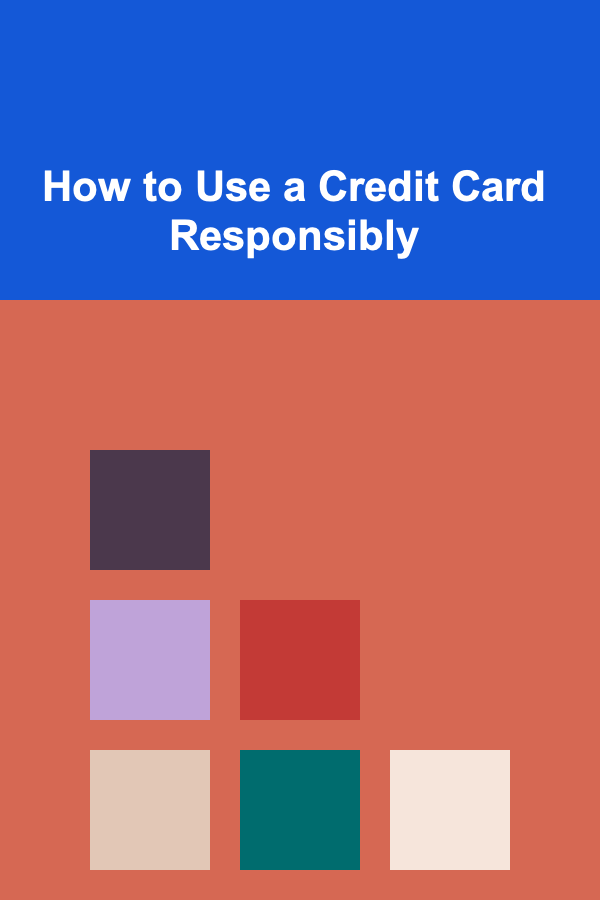
How to Use a Credit Card Responsibly
ebook include PDF & Audio bundle (Micro Guide)
$12.99$7.99
Limited Time Offer! Order within the next:

Credit cards can be powerful financial tools when used correctly. They offer a variety of benefits, from building credit history and earning rewards to providing financial flexibility in times of need. However, when used irresponsibly, credit cards can lead to overwhelming debt, high-interest rates, and financial distress. Understanding how to use a credit card responsibly is essential for maximizing its benefits while avoiding the pitfalls that can negatively impact your financial health.
In this comprehensive guide, we will explore the key principles of responsible credit card usage, how to manage your credit card effectively, and tips for leveraging credit cards to improve your financial standing.
What is Responsible Credit Card Usage?
Responsible credit card usage involves using your credit card in a way that aligns with your financial goals while avoiding the risks of overspending, accumulating excessive debt, and damaging your credit score. It requires discipline, knowledge, and careful planning. By using credit cards responsibly, you can build a positive credit history, manage your finances better, and enjoy the perks and rewards that come with credit card ownership.
The Importance of Responsible Credit Card Use
Using a credit card responsibly offers several advantages, including:
- Building Credit History: One of the primary benefits of using a credit card is the opportunity to build your credit history. Your credit score is a reflection of your ability to manage credit, and a good credit score is essential for obtaining loans, mortgages, and favorable interest rates.
- Earn Rewards: Many credit cards offer rewards programs that allow you to earn cashback, points, or travel miles on your purchases. Responsible credit card usage ensures that you can take full advantage of these benefits without falling into debt.
- Financial Flexibility: A credit card can provide you with financial flexibility, allowing you to make purchases and pay them off over time. It can be particularly useful in emergencies or when making large purchases that require spreading payments over a few months.
- Consumer Protection: Credit cards offer protection against fraud, and many issuers provide additional perks such as extended warranties, purchase protection, and travel insurance. By using your credit card responsibly, you can take full advantage of these protections.
The Risks of Irresponsible Credit Card Use
Irresponsible credit card use can lead to numerous financial problems, including:
- Accumulating Debt: If you fail to pay off your credit card balance in full each month, interest charges will accumulate on your outstanding balance. Credit cards often come with high-interest rates, which can quickly lead to significant debt if not managed properly.
- Damage to Credit Score: Missed or late payments can negatively affect your credit score, making it harder to secure loans, obtain favorable interest rates, or even rent an apartment. A low credit score can also increase the cost of insurance premiums.
- Financial Stress: Carrying high levels of credit card debt can lead to financial stress and anxiety. The pressure to make minimum payments while interest charges continue to grow can be overwhelming.
- Bankruptcy: In extreme cases, irresponsible credit card use can lead to bankruptcy, which can have long-lasting consequences on your financial life and ability to obtain credit in the future.
How to Use a Credit Card Responsibly
Now that we've covered the risks of irresponsible credit card use, let's look at the key strategies for using a credit card responsibly.
1. Pay Your Balance in Full Every Month
One of the most important rules of responsible credit card use is to pay off your credit card balance in full each month. If you carry a balance from month to month, interest will accrue on your outstanding balance, making it harder to pay off your debt.
- Why Pay in Full?: Credit card issuers typically charge high-interest rates on outstanding balances. By paying your balance in full every month, you avoid paying interest on your purchases, allowing you to use your credit card without incurring additional costs.
- How to Ensure You Can Pay in Full: Before making purchases with your credit card, ensure that you can afford to pay the full balance by the due date. If you're unsure whether you'll be able to pay the balance, consider only making essential purchases or setting a budget to keep your spending in check.
2. Make Payments On Time
Late payments can lead to late fees, higher interest rates, and a negative impact on your credit score. To avoid these consequences, make sure to pay your credit card bill on time each month.
- Set Up Reminders: Many credit card companies offer automatic payment reminders, which can help you stay on top of your payment due dates. You can also set up recurring payments or use calendar reminders to ensure you never miss a payment.
- Minimum Payments vs. Full Payments: While paying the minimum payment is better than missing a payment, it's always best to pay more than the minimum to reduce your balance faster and minimize interest charges.
3. Monitor Your Spending
Tracking your credit card spending is crucial for managing your finances and avoiding overspending. With the convenience of credit cards, it can be easy to lose track of how much you're spending.
- Use Budgeting Apps: Many personal finance apps allow you to link your credit card accounts and track your spending. These apps can provide insights into where your money is going and help you stay within your budget.
- Review Your Statements: Regularly review your credit card statements to check for any unauthorized charges or errors. If you notice discrepancies, report them to your credit card issuer immediately.
4. Keep Your Credit Utilization Low
Credit utilization is the ratio of your credit card balances to your credit limits. It's an important factor in determining your credit score. A lower credit utilization ratio indicates that you're using your credit responsibly and not relying too heavily on credit.
- Ideal Credit Utilization: Financial experts recommend keeping your credit utilization below 30% of your total credit limit. For example, if your credit card limit is $10,000, you should aim to keep your balance below $3,000.
- How to Maintain Low Credit Utilization: To maintain a low credit utilization ratio, try to pay off your credit card balances before your statement date, or consider requesting a credit limit increase from your issuer to reduce your utilization ratio.
5. Avoid Unnecessary Debt
Credit cards are often used for convenience, but it's important to avoid using them for unnecessary or impulse purchases that can lead to debt. Before making a purchase with your credit card, ask yourself whether it's something you truly need or whether it's something you can afford to pay for with cash.
- Plan Your Purchases: Make a list of items you want to buy and prioritize essential purchases. Consider waiting before making a large purchase to ensure that you really need it.
- Avoid Using Credit for Non-Essential Items: While it's tempting to use your credit card to purchase non-essential items like electronics, clothes, or luxury items, remember that using credit for things you don't need can quickly spiral into unnecessary debt.
6. Take Advantage of Rewards and Perks
Many credit cards offer rewards programs, such as cashback, points, or travel miles, for purchases made with the card. When used responsibly, these rewards can provide additional value and help you save money or earn discounts.
- Choose the Right Rewards Card: Select a credit card that aligns with your spending habits. For example, if you travel frequently, a card that offers travel rewards may be a good option. If you spend a lot on groceries, look for a card that offers cashback on food purchases.
- Use Rewards Wisely: Avoid spending more than necessary just to earn rewards. The best way to maximize your rewards is to use your credit card for regular purchases you would make anyway and pay off the balance in full each month to avoid interest charges.
7. Protect Your Credit Card Information
Credit card fraud is a serious issue, and protecting your credit card information is crucial for responsible credit card use. Be cautious about where and how you use your credit card.
- Use Secure Websites: When shopping online, make sure the website is secure by checking for "https://" in the URL and a padlock icon. Avoid using public Wi-Fi to make purchases.
- Monitor for Fraud: Regularly check your credit card statements for unauthorized transactions. Many credit card issuers offer fraud protection and will alert you to suspicious activity.
- Report Lost or Stolen Cards Immediately: If your credit card is lost or stolen, report it to your credit card issuer immediately to minimize the risk of unauthorized charges.
8. Build a Good Credit History
Using your credit card responsibly over time will help you build a positive credit history, which is essential for securing loans, mortgages, and favorable interest rates in the future. Your credit history is built on factors like on-time payments, low credit utilization, and a mix of credit types.
- Start Early: If you're new to credit, consider applying for a secured credit card or becoming an authorized user on someone else's card. Responsible use of these cards will help you build credit over time.
- Avoid Too Many Credit Inquiries: Every time you apply for a new credit card, a hard inquiry is made on your credit report. Too many inquiries in a short period can lower your credit score. Be strategic about applying for new credit.
Conclusion
Using a credit card responsibly is key to avoiding debt, building a positive credit history, and enjoying the perks that come with credit card ownership. By paying your balance in full each month, making timely payments, monitoring your spending, and using your card for essential purchases, you can ensure that your credit card works for you rather than against you.
Responsible credit card usage takes time and discipline, but the rewards---both financial and personal---are well worth the effort. With the right strategies in place, you can make your credit card an essential part of your financial toolkit while safeguarding your financial future.

Building a Passive Income Stream Through AI and Deep Learning
Read More
How to Design a Stunning Holiday Wreath for Your Door
Read More
How to Set Up a Profitable Home Rental Business
Read More
How to Use Decorative Trunks for Stylish Storage
Read More
How to Use Etsy Shop Management to Make Money
Read More
10 Tips for Choosing the Right Genetic Counselor
Read MoreOther Products

Building a Passive Income Stream Through AI and Deep Learning
Read More
How to Design a Stunning Holiday Wreath for Your Door
Read More
How to Set Up a Profitable Home Rental Business
Read More
How to Use Decorative Trunks for Stylish Storage
Read More
How to Use Etsy Shop Management to Make Money
Read More